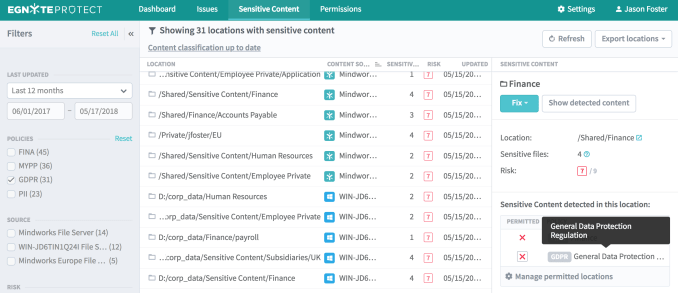Egnyte releases one-step GDPR compliance solution
Egnyte has always had the goal of protecting data and files wherever they live, whether on-premises or in the cloud. Today, the company announced a new feature to help customers comply with GDPR privacy regulations that went into effect in Europe last week in a straight-forward fashion.
You can start by simply telling Egnyte that you want to turn on “Identify sensitive content.” You then select which sets of rules you want to check for compliance including GDPR. Once you do this, the system goes and scans all of your repositories to find content deemed sensitive under GDPR rules (or whichever other rules you have selected).

Photo: Egnyte
It then gives you a list of files and marks them with a risk factor from 1-9 with one being the lowest level of risk and 9 being the highest. You can configure the program to expose whichever files you wish based on your own level of compliance tolerance. So for instance, you could ask to see any files with a risk level of seven or higher.
“In essence, it’s a data security and governance solution for unstructured data, and we are approaching that at the repository levels. The goal is to provide visibility, control and protection of that information in any in any unstructured repository,” Jeff Sizemore, VP of governance for Egnyte Protect told TechCrunch.

Photo: Egnyte
Sizemore says that Egnyte weighs the sensitivity of the data against the danger it could be exposed and leave a customer in violation of GDPR rules. “We look at things like public links into groups, which is basically just governance of the data, making sure nothing is wide open from a file share perspective. We also look at how the information is being shared,” Sizemore said. A social security number being shared internally is a lot less risky than a thousand social security numbers being shared in a public link.
The service covers 28 nations and 24 languages and it’s pre-configured to understand what data is considered sensitive by country and language. “We already have all the mapping and all the languages sitting underneath these policies. We are literally going into the data and actually scanning through and looking for GDPR-relevant data that’s in the scope of Article 40.”
The new service is generally available on Tuesday morning. The company will be makign an announcement at the InfoSecurity Conference in London. It has had the service in Beta prior to this.
from TechCrunch https://ift.tt/2M00pj1


No comments
Post a Comment